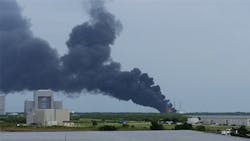A SpaceX Falcon 9 rocket exploded Thursday morning during a static fire test on a launch pad at Cape Canaveral Air Force Station in Florida, resulting in the loss of both the rocket and its $200 million payload.
The rocket had been scheduled to launch Saturday and deliver the AMOS-6 communication satellite, which had been built primarily by Israel Aerospace Industries and operated by Spacecom. The communications satellite had a planned mission duration of 15 years and, among other purposes, would have allowed Facebook to beam broadband Internet as part of its Internet.org initiative.
According to numerous eyewitness reports, the Falcon 9 explosion shook buildings miles away and filled the air with dark smoke. The initial explosion occurred shortly after 9 a.m. EDT and sounded like lightning, according to reports. A series of additional explosions followed for several minutes.
SpaceX quickly released a statement, confirming “that in preparation for today’s static fire, there was an anomaly on the pad resulting in the loss of the vehicle and its payload. Per standard procedure, the pad was clear and there were no injuries.”
SpaceX founder and CEO Elon Musk tweeted Thursday afternoon that the problem “originated around (the) upper stage oxygen tank” and that the cause was still unknown. Later Thursday night, when asked by a follower whether the SpaceX Dragon spacecraft might have suffered the a similar fate given then circumstances, he tweeted that the Dragon “would have been fine” and that “this seems instant, from a human perspective, but it really (is) a fast fire, not an explosion.”
The purpose of the static test fire, according to a NASA Space Flight story published shortly after the explosion, “is to provide a dress rehearsal for the launch team, culminating in a three-second firing of all nine of the first state Merlin 1D engines to validate the health of the rocket.”
Despite reports that pieces of the rocket were found more than two miles from the launch pad, Brevard County officials tweeted “there is no threat to (the) general public from (the) catastrophic abort during static test fire at SpaceX launch pad … this morning.”
In a statement, Florida Democratic senator Bill Nelson said, “Today’s incident reminds us all that space flight is an inherently risky business. As we continue to push the frontiers of space, there will be both triumphs and setbacks. But at the end of the day, I’m confident that our commercial space industry will be very successful.”
SpaceX had been in the news earlier this week for happier and more promising news: It had agreed with satellite operator SES to launch a commercial satellite in the fourth quarter by reusing a Falcon 9 rocket.
The company had been leasing the Cape Canaveral launch pad from the Air Force, and had been increasing its number of launches to counter a backlog created by a separate accident in June 2015.
Musk said in April that rockets cost about $60 million to build, and about $300,000 to fuel.
About the Author
Matt LaWell
Staff Writer
Staff writer Matt LaWell explores news in manufacturing technology, covering the trends and developments in automation, robotics, digital tools and emerging technologies. He also reports on the best practices of the most successful high tech companies, including computer, electronics, and industrial machinery and equipment manufacturers.
Matt joined IndustryWeek in 2015 after six years at newspapers and magazines in West Virginia, North Carolina and Ohio, a season on the road with his wife writing about America and minor league baseball, and three years running a small business. He received his bachelor's degree in magazine journalism from Ohio University.
